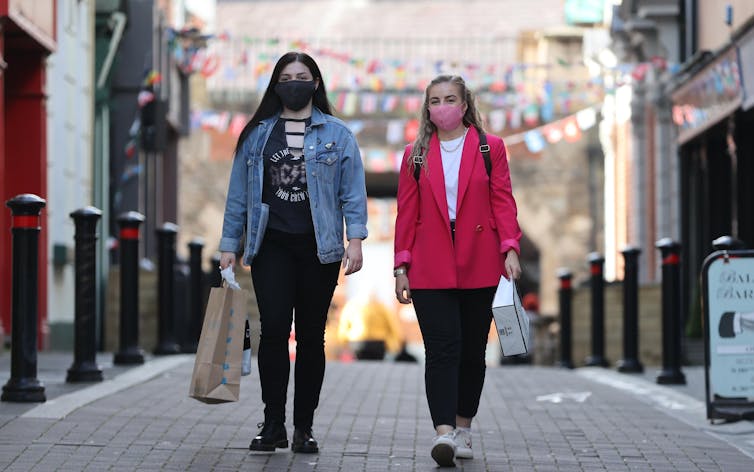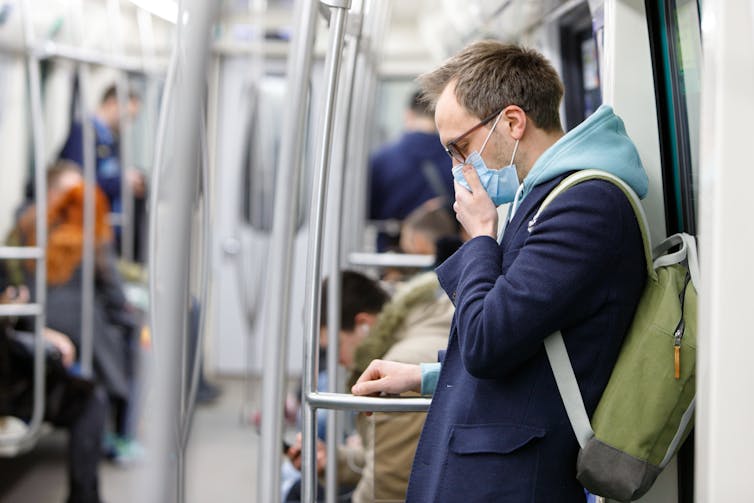Grace C Roberts, Queen’s University Belfast
With COVID-19 cases rising rapidly and 83% of beds in intensive care currently occupied, things have not been going well in Northern Ireland.

Therefore, after a long meeting on Tuesday October 13, First Minister Arlene Foster announced that the government would be introducing a set of “circuit breaker” restrictions to try to curb the spread of the virus, beginning on Friday October 16. Northern Ireland is the first UK country to try this tactic.
With a circuit breaker, authorities tighten restrictions on what people can do for a set amount of time to reduce transmission of the virus, to try to avoid needing to go into full lockdown. Northern Ireland’s four-week plan includes closing all bars and restaurants (except for takeaways), stopping indoor amateur sports, and shutting close-contact services such as hairdressing.
Different households are banned from mixing in private homes (though two households can still meet outdoors), and people are being advised to work from home where possible. University learning is strongly advised to be online, and the half-term school holiday is being extended to two weeks.
Other parts of the UK are also considering launching their own circuit breakers.
How did we get here?
Northern Ireland currently has over 13,000 cases per 1 million people, which is above the UK-wide rate of around 10,000 per millions.
But earlier in the pandemic, Northern Ireland was not as severely affected as the rest of the UK. Its infection rate was much lower than England’s. On July 1, 4,880 of the UK’s 283,770 cases had been in Northern Ireland – accounting for 1.7% of infections despite having 2.9% of the UK population.
This was possibly down to geography. Northern Ireland has a much higher rural population than the majority of the UK, with approximately 36% of the population residing in rural areas. This may have led to lower viral transmission, as pathogens spread quicker in densely populated areas.
There’s also much more travel from Northern Ireland across the land border with the Republic of Ireland than to rest of the UK. Because the Republic of Ireland implemented a lockdown earlier than the UK and had additional restrictions on movement and travel, this may have limited the number of new infections brought into Northern Ireland.
In recent weeks, however, Northern Ireland has seen a large surge of coronavirus cases. Almost 70% of the total recorded cases in the country have occurred since the start of September, compared with about 50% for the UK as a whole. It’s unclear precisely why Northern Ireland has gone from faring better than the rest of the UK to now faring worse, but the start of the university year could be a big factor.
A quirk of Northern Ireland’s small size is that students can easily visit home on a regular basis, and a large proportion of students visit their family every weekend. Many also have weekend jobs, meaning they are regularly coming into contact with multiple groups of people. The opening of universities therefore has made the country a lot more connected – which may partly explain why cases have increased dramatically since courses began in September.
Will these restrictions work?
Much like the UK-wide lockdown in March, it’s hoped the circuit breaker will reduce the virus’s spread and prevent the health service from becoming overwhelmed.
Most of the restrictions are aimed at limiting non-essential indoor mixing, such as socialising in private homes, indoor sports and hospitality. We know the risk of transmission is much higher indoors, so targeting indoor environments is a sensible approach. But because infected individuals can spread the virus before developing symptoms, it’s very difficult to accurately determine where transmission occurs.
Research shows the vast majority of spread is due to close contact with infected individuals. Primarily this happens in homes, but there’s also evidence of transmission in public indoor settings such as offices or churches, particularly where exposure occurs over a longer time. Therefore, if there’s still plenty of mixing in schools, universities and workplaces in Northern Ireland, then this may limit the effectiveness of the plan.

Another factor to consider is the virus’s incubation period – the time between catching the virus and developing symptoms. On average the incubation period of SARS-COV-2 is five days, but it can extend to up two weeks. We know that individuals can spread the virus during this period before their symptoms start, and that some may never develop symptoms but still be infectious.
With this in mind, the longer the restrictions are in place, the more effective they’ll be at reducing viral spread. It’s important for the circuit breaker to remain in place longer than the upper end of the potential incubation period if it’s to have a good chance of significantly reducing the rate of transmission. It’s good therefore that Northern Ireland has opted for a four-week set of restrictions.
The success of circuit breakers in countries such as Singapore and New Zealand suggests these tactics could work for Northern Ireland. However, these countries’ case numbers were drastically lower than what we’re witnessing in Northern Ireland and the UK as a whole at present. To find out how effective circuit breakers can be here, we’ll have to wait and see.
Grace C Roberts, Research Fellow in Virology, Queen’s University Belfast
This article is republished from The Conversation under a Creative Commons license. Read the original article.












